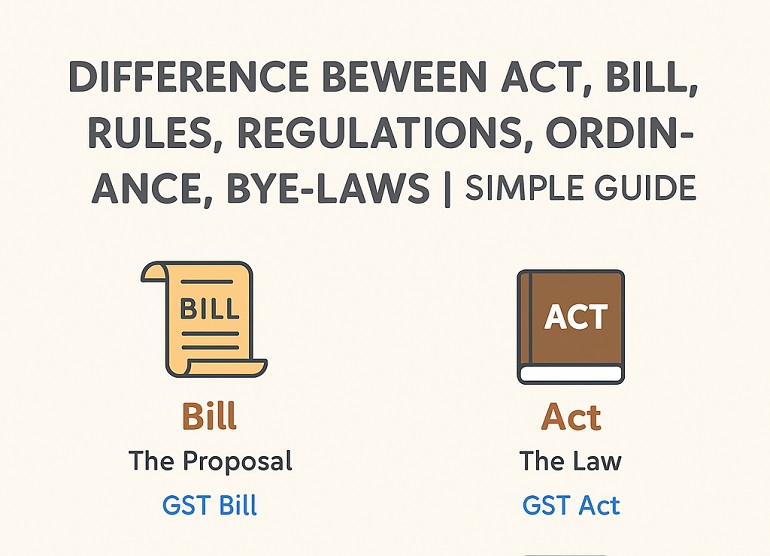Difference Between Act, Bill, Rules, Regulations, Ordinance & Bye-laws | Simple Legal Guide
When we read newspapers or listen to news, we often hear
words like Act, Bill, Rules, Ordinance and so on.
Many people think all these words mean the same thing — but they don’t. Each
one has a different role in our legal system. Let’s break it down in a very
simple way.
1. Bill – The Proposal
Think of a Bill as an idea for a new law. It is just
a draft (a rough copy) placed in front of Parliament or State
Legislature.
- If
approved by both Houses and signed by the President (or Governor), it
becomes an Act.
Example: The GST Bill was just a proposal at first. Once passed, it became the GST Act, 2017.
2. Act – The Law
An Act is the final version of a Bill. Once approved
and signed, it becomes an official law.
- Acts
tell us the broad rules and principles, but not always the step-by-step
details.
Example: Indian Penal Code (IPC) is an Act that defines crimes and punishments.
3. Rules – The How-To Guide
Rules are like an instruction manual. They explain how an
Act will actually work in day-to-day life.
- Made
by the government under the power given by the Act.
Example: The Motor Vehicles Act is the law, but the Central Motor Vehicle Rules explain how licenses, fines, and road safety will be handled.
4. Regulations – The Specialist Instructions
Some authorities (like RBI, SEBI, IRDAI) are experts in
their fields. They make Regulations to control specific industries.
- These
are more detailed than Rules and apply only to certain sectors.
Example: SEBI makes regulations for how companies trade shares on the stock market.
5. Ordinance – Emergency Law
Sometimes, Parliament or a State Assembly is not in session
but an urgent law is needed. In such cases, the President (or Governor) can
bring in an Ordinance.
- An
Ordinance has the same power as an Act but is temporary. It must be
approved by the legislature within a few weeks, or it lapses.
Example: When quick action was required on land laws, the government issued a Land Ordinance.
6. Bye-laws – Local Rules
Bye-laws are small laws made by local authorities like
municipal corporations, housing societies, or panchayats.
- They
apply only to that specific area or society.
Example: A municipal bye-law can tell shopkeepers when they must close their shops, or a housing society bye-law can decide parking rules.
7. Quick Comparison
|
Term |
Meaning in Simple Words |
Example |
|
Bill |
Proposal for a new law |
GST Bill |
|
Act |
Final law after approval |
GST Act |
|
Rules |
How the law will be applied |
Motor Vehicle Rules |
|
Regulations |
Special instructions by regulators |
SEBI Regulations |
|
Ordinance |
Temporary law in emergency |
Land Ordinance |
|
Bye-laws |
Local laws for small areas |
Municipal parking bye-laws |
By knowing these simple differences, we can better
understand how laws are made, applied, and followed in our country.







